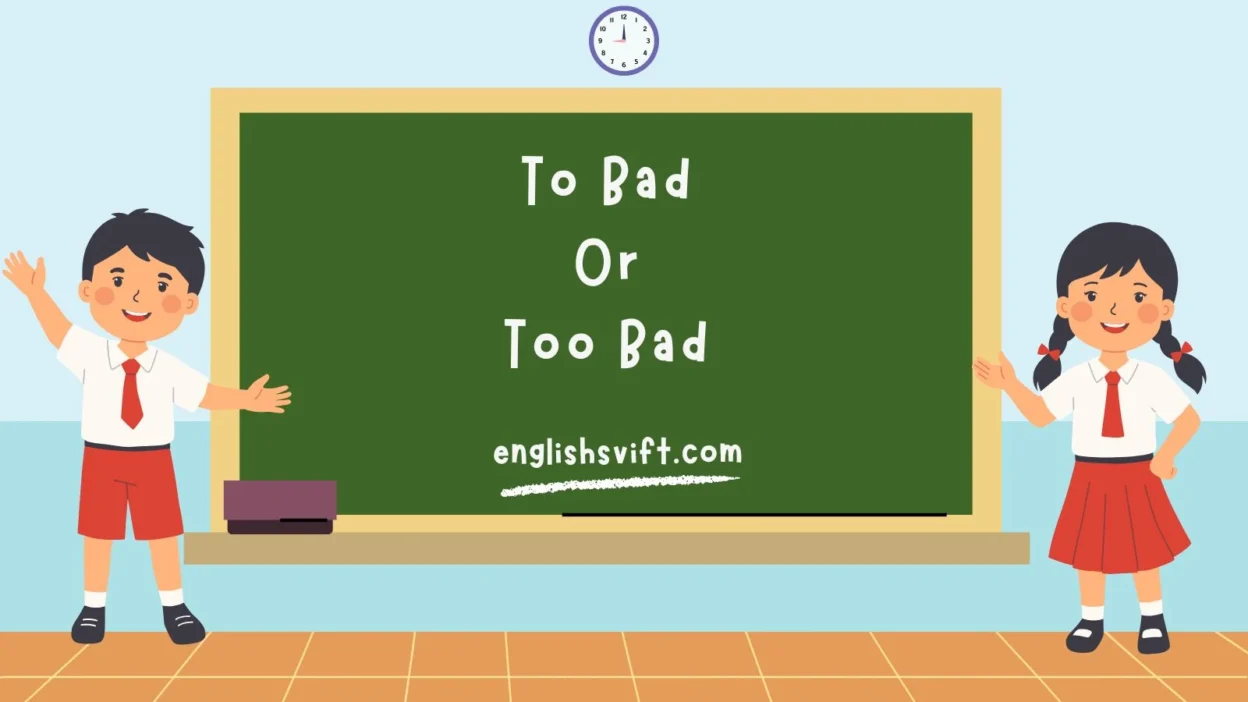Mistakes in English often come from tiny words that sound the same but serve different purposes. One of the most common confusions learners face is the difference between “to bad” and “too bad.” At first glance, they look similar. In rapid speech, they even sound nearly identical. But only one of them is grammatically correct and widely used in real-life communication.
In this detailed guide, we’ll explore the grammar, meaning, idiomatic expressions, synonyms, real-life usage, and common mistakes with “to bad” vs “too bad.” We’ll also use tables, examples, and breakdowns so you can quickly master this phrase and never confuse it again.
To Bad vs Too Bad – Why Learners Get Confused
The confusion stems from:
- Phonetic similarity: “To” and “Too” sound identical in speech.
- Overuse in casual conversation: People hear “too bad” often but misspell it as “to bad.”
- Grammar rules: “To” functions differently (preposition/infinitive marker) compared to “too” (adverb of degree).
| Word | Function | Example | Meaning |
| To | Preposition / Infinitive marker | I’m going to the store. | Direction / purpose |
| Too | Adverb (degree / excess) | That’s too hot to eat. | Excessive / very |
| Bad | Adjective | The weather is bad today. | Negative quality |
👉 When combined, “too bad” creates an idiomatic expression meaning “unfortunate” or “regrettable.” “To bad” has no valid grammatical role in English.
Grammar Rules: “To” as a Preposition vs “Too” as an Adverb
To
- Shows direction: She went to school.
- Introduces infinitives: I want to eat.
Too
- Means “also”: I want coffee too.
- Means “excessively/very”: The soup is too hot.
Bad
- Adjective describing something negative: That’s a bad idea.
👉 Combining them:
- ❌ To bad = grammatically wrong.
- ✅ Too bad = correct expression.
What “Too Bad” Really Means in English
“Too bad” is an idiomatic phrase that expresses:
- Sympathy or regret → “Oh, that’s too bad you missed the concert.”
- Dismissal or indifference → “Can’t come to the party? Too bad!”
- Unfortunate outcome → “It rained during our picnic—too bad.”
| Expression | Tone | Context Example |
| Too bad (sympathetic) | Gentle, regretful | “Your flight got canceled? That’s too bad.” |
| Too bad (dismissive) | Harsh, indifferent | “You lost the game? Too bad, try harder next time.” |
Why “To Bad” Is Incorrect Grammar
The phrase “to bad” doesn’t follow any valid English grammar rules. It incorrectly combines a preposition/infinitive marker (to) with an adjective (bad) without a noun or verb to complete the construction.
Examples of incorrect usage:
- ❌ That’s to bad.
- ❌ He felt to bad about it.
Correct forms:
- ✅ That’s too bad.
- ✅ He felt bad about it.
Common Situations Where “Too Bad” Is Used
Here’s how “too bad” naturally appears in everyday communication:
| Situation | Example Sentence |
| Missed opportunities | “Too bad you couldn’t join us for dinner.” |
| Expressing pity | “Oh no, that’s too bad about your ankle.” |
| Casual dismissal | “You forgot the homework? Too bad.” |
| Minor inconveniences | “It’s raining—too bad we can’t go hiking.” |
| Social regret | “The bakery ran out of croissants? Too bad.” |
Idiomatic Expressions with “Too Bad”
“Too bad” often appears in idioms or casual expressions:
- “Too bad, so sad.” (dismissive)
- “Well, that’s too bad.” (regretful)
- “Too bad for you.” (sarcastic or competitive)
“Too Bad” vs Similar Expressions (Shame, Pity, Regret)
Sometimes “too bad” overlaps with words like shame, pity, regrettable.
| Expression | Tone | Example |
| Too bad | Neutral / Sympathetic | “That’s too bad you missed the show.” |
| What a shame | More emotional | “What a shame the game was canceled.” |
| Pity | Formal, polite | “It’s a pity you couldn’t attend.” |
| Regrettable | Formal / academic | “It’s regrettable that the policy failed.” |
Synonyms for “Too Bad” and Their Nuances
Here are common synonyms and when to use them:
| Synonym | Nuance | Example |
| Unfortunate | Neutral, objective | “It’s unfortunate that the meeting was delayed.” |
| Regrettable | Formal, academic | “A regrettable error in the report.” |
| Lamentable | Literary | “A lamentable outcome of war.” |
| That sucks | Informal, slang | “Missed the bus? That sucks!” |
| Oh well | Casual resignation | “No pizza left? Oh well.” |
Real-Life Examples: Conversations, Emails, and Texting
Conversation:
- Jenny: “I missed the last slice of pizza.”
- Mark: “Too bad, it was delicious.”
Texting:
- A: “Can’t come tonight 😔”
- B: “Too bad, we’ll miss you.”
Email:
- “It’s too bad you won’t be attending the conference, but we’ll share the recording.”
The Emotional Weight of “Too Bad” in Communication
Tone matters. “Too bad” can sound:
- Sympathetic → showing genuine regret.
- Dismissive → expressing indifference.
- Sarcastic → mocking someone’s misfortune.
👉 Non-verbal cues (tone of voice, facial expressions, emojis) play a big role in interpreting intent.
When “Too Bad” Sounds Sympathetic vs Dismissive
| Usage | Sympathetic Example | Dismissive Example |
| Spoken tone | “That’s too bad, I’m really sorry.” | “Missed the deadline? Too bad.” |
| Written text | “Too bad you’re sick, hope you recover.” | “Too bad, rules are rules.” |
| Emojis | 😔, 😢 | 😂, 😏 |
“Too Bad” in Formal vs Informal English
- Formal writing: Avoid “too bad.” Use alternatives like unfortunate or regrettable.
- Casual speech: Perfectly fine and natural.
Example:
- Academic: “It is regrettable that the project was delayed.”
- Conversation: “Too bad we couldn’t finish today.”
Grammar Breakdown: Adjectives, Adverbs, and Intensifiers
- Too = adverb of degree → modifies adjectives/adverbs.
- Bad = adjective → describes a noun.
Examples:
- The coffee is too hot.
- The news was too bad for us to ignore.
👉 “Too” intensifies “bad,” creating an idiomatic unit.
Homophones and Confusing Pairs: To, Too, Two
Learners often confuse:
- To (direction/purpose)
- Too (excess/also)
- Two (number 2)
| Word | Function | Example |
| To | Preposition/infinitive marker | “I’m going to London.” |
| Too | Adverb | “I’m coming too.” |
| Two | Number | “We have two tickets.” |
Examples of Incorrect Constructions: “To Bad” in Sentences
❌ That’s to bad for her.
✅ That’s too bad for her.
❌ He felt to bad about missing class.
✅ He felt bad about missing class.
❌ She wanted to bad eat ice cream.
✅ She wanted to eat ice cream badly.
Native Speaker Usage vs ESL Learner Mistakes
- Native speakers rarely confuse spelling because of exposure.
- Learners often miswrite “to bad” due to phonetic similarity.
Tip: Remember: “Too = Excessive.” If it’s expressing “very” or “unfortunate,” it must be too.
Cross-Cultural and Translation Variations of “Too Bad”
Translations:
- French: dommage
- German: schade
- Spanish: qué lástima
- Italian: peccato
👉 Each carries slightly different emotional weight.
Phonetic Similarities: Why “To” and “Too” Get Mixed Up
Both are pronounced /tuː/. Without context, learners can’t distinguish them in speech. Writing, however, must follow grammar rules.
“Too Bad” in Pop Culture, Movies, and Music
- Friends (Chandler Bing): sarcastic “Too bad!” moments.
- Pulp Fiction (1994) – dismissive tone.
- Common in memes, GIFs, and texting slang.
Practical Grammar Tables for Learners
| Wrong Form | Correct Form | Explanation |
| To bad | Too bad | “To bad” doesn’t exist in grammar. |
| He felt to bad. | He felt too bad. | Needs “too” as intensifier. |
| That’s to bad. | That’s too bad. | Correct idiomatic expression. |
Teaching & Learning Strategies: Avoiding the Error
- Use mnemonics: “Too bad is too common.”
- Flashcards, quizzes, fill-in-the-blanks.
- Peer correction and proofreading.
Proofreading & Editing Tips: Spotting “To Bad”
- Use tools like Grammarly.
- Read sentences aloud. If “too” = “very,” then it’s correct.
Writing Techniques: Academic, Business, and Casual Contexts
- Academic → avoid “too bad.”
- Business → use “regrettable/unfortunate.”
- Casual → “too bad” works naturally.
FAQs: Clarifying the Most Common Questions
Q1: Is “to bad” ever correct?
No. It’s always incorrect in English grammar.
Q2: Why do people write “to bad”?
Because “to” and “too” sound the same, especially in fast speech.
Q3: Can I use “too bad” in professional emails?
Better avoid it. Use “unfortunate” or “regrettable” instead.
Q4: Is “too bad” rude?
It depends on tone. It can sound sympathetic or dismissive.
Q5: What’s the difference between “too bad” and “so bad”?
- “Too bad” = unfortunate/regrettable.
- “So bad” = very bad (degree, not idiomatic).
Conclusion
The phrase “too bad” may look simple, but it carries layers of meaning, tone, and context. It can sound kind, indifferent, or even sarcastic depending on how it’s delivered. What’s important is remembering that “to bad” is always incorrect—it’s a common learner mistake caused by phonetic similarity.
By practicing examples, using tables, and paying attention to tone, you’ll not only avoid the error but also sound more natural and confident in English communication.
So next time you see someone write “to bad”… just smile and think:
👉 Too bad they didn’t read this guide. 😉



